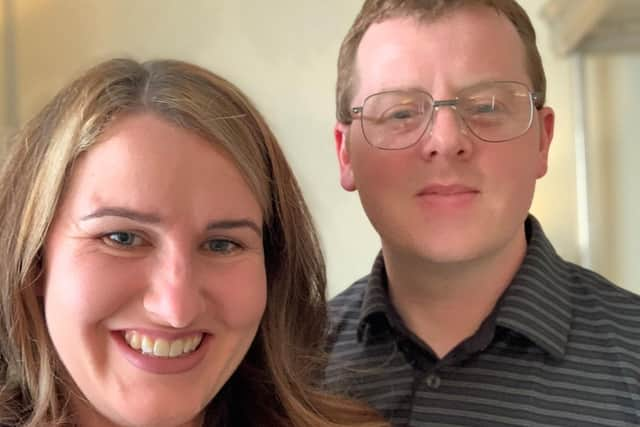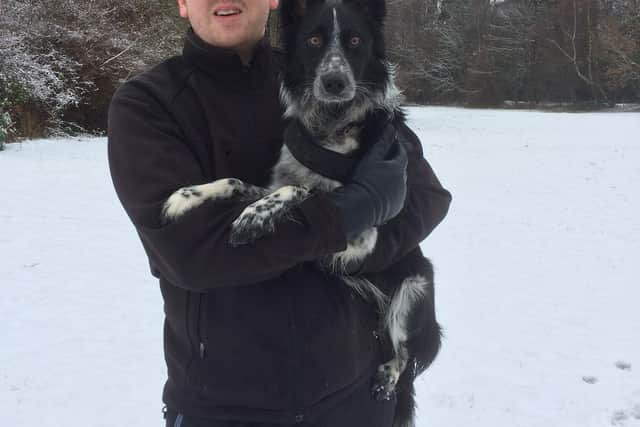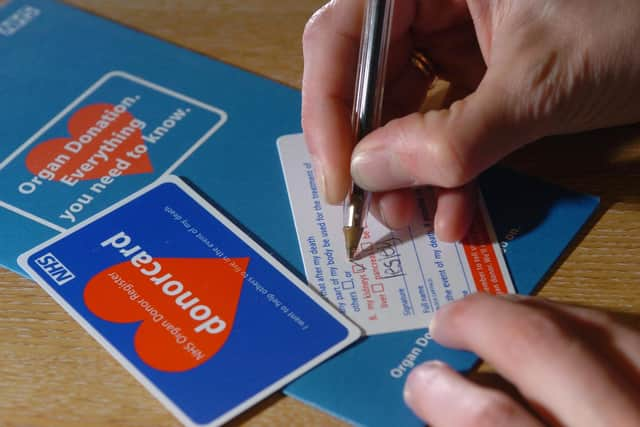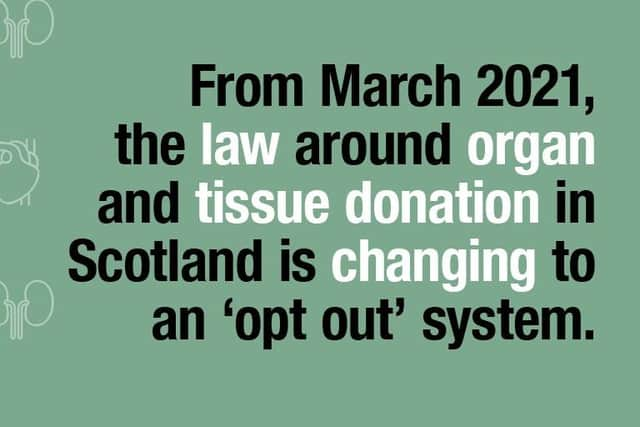Organ donor opt out: Fife heart transplant man backs new law change
The RAF aeronautical engineer was so ill that at one stage he recorded a farewell message to his wife, and told close friends to prepare for the worse.
Luke, from Glenrothes, shared his story as Scotland changed its law on organ and tissue donation to one of opt out.
Advertisement
Hide AdAdvertisement
Hide AdFrom now, anyone aged 16 or over who hasn’t recorded a decision about donation will be considered a possible donor if they die in circumstances in which they could donate.


It’s an emotive issue, but the move is one Luke believes can only help others in need of life-saving donations.
He said: “In my opinion it’s always needed to be an opt out system.
“I have always been registered as a donor, and I have since used my experience to raise awareness particularly within the forces.
“It’s important to respect that everyone has a choice, but I would urge everyone to look at the impact organ and tissue donation can have on people’s lives.”


Luke’s story underlines the incredible life-changing benefits that can come from being an organ and tissue donor.
Three days before his 39th birthday he discovered he had just days to live without any medical intervention.
He was diagnosed with dilated cardiomyopathy in June 2019 after being hospitalised with flu-like symptoms, and transferred to the Golden Jubilee National Hospital for urgent treatment. He was placed on an intra-aortic balloon pump machine, which kept him alive while he waited for a life-saving transplant.
Advertisement
Hide AdAdvertisement
Hide AdLuke said: “I’d been experiencing flu-like symptoms for five weeks before I was admitted to hospital.


“But, up until that point I had been leading a normal, healthy life.
“I was shocked to be diagnosed with dilated cardiomyopathy. I’d never had any symptoms at all – and after 23 years in the military I thought I was reasonably fit and healthy.”Luke discovered his heart had failed repeatedly and the only treatment was to be placed on an intra-aortic balloon pump machine until doctors could identify a suitable heart to transplant.
He was hospital bound until the transplant could take place, and was reliant on the balloon pump to keep him alive.
Due to a rare blood type and his height, he was told that hew was looking at eight or nine months on the waiting list - and there were to be tough moments on the road ahead.


Luke said: “Whilst waiting for the call, my balloon pump failed resulting in me needing a difficult emergency surgery.
“At this point I was so convinced my time had come that I recorded a final message on my phone for my wife to listen to in case the worst happened, and spoke to some friends to prepare them.”
Fortunately the emergency surgery succeeded, and after a false alarm, Luke received the life-changing news in September 2019 that a donor heart had been found - just three months after he was added to the waiting list.
Advertisement
Hide AdAdvertisement
Hide AdHe said: “I just so happened to be awake at 4:00am when the transplant co-ordinator passed my room to see the light on, and came in to share the news that a match had been found.
“It was a surreal moment when my surgeon bounced into my room a couple of hours later to tell me this was a perfect match in every way for me.”
The surgery went incredibly well.
“I’ve been told that as soon as they reattached the heart it was beating so strongly, and it didn’t require any outside assistance.
“Astonishingly I was off the ventilator the day after the transplant, able to get out of bed the following day, and only 12 days later I was home.
“It was actually quite frightening to have no assistance after spending so long reliant on care in hospital.”
Talking about the life-changing impact of the transplant, Luke said: “The most important thing is that I’m alive today, and that’s thanks to my donor. I’m sad that someone else had to die for me to live, and I think about that every day.
“Both my wife and I wrote letters to the family of my donor but I can’t put into words how valuable that gift is, and I want to make sure I make the most of that gift every day.
“If I hadn’t gone to hospital that day I was told I would’ve died.
Advertisement
Hide AdAdvertisement
Hide Ad“I’m never going to be the person I was before, I’m very lucky to have received a transplant, and since the surgery I am thankful every day.”
Luke has since raised awareness or organ and tissue donation - now everyone in his unit has signed up to be a donor.
NHS Fife has urged people to make time to share their donation decision.
Everyone still has a choice – to be a donor or to opt out.
People can record their decision to be a donor or to opt out on the NHS Organ Donor Register at any time.
If people do nothing, it will be assumed they agree to donate, unless they are in a group for whom the law does not apply.
Sharing that decision with family remains important as they will still be involved in the donation process, and having that knowledge can make it easier for them to ensure a loved one’s decision is honoured.
Janette Owens, NHS Fife's director of nursing said: “I’d encourage people to think about what they’d want to happen as every opportunity for donation is precious.
“Whatever you decide, record it on the NHS Organ Donor Register and tell your family to help ensure that decision is honoured.
Visit organdonationscotland.org or call 0300 303 2094.